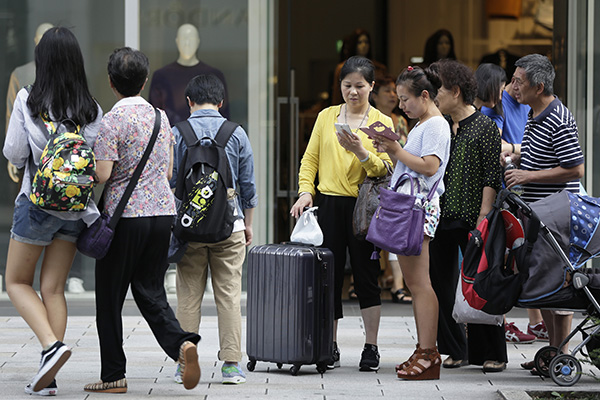China's global presence places demands on security
By Chua Chin Leng (chinadaily.com.cn) Updated: 2016-01-05 14:59
 |
|
Chinese tourists visit Tokyo's Ginza district for shopping in August. Japan is the second-most popular overseas destination. [Photo provided to China Daily] |
2016 sees the unabated rise of China's economic investments and commercial activities in other parts of the world. China is now the biggest trading partner or one of the top few trading partners of more than 50 countries and the number is growing.
China is also actively bidding and engaging in infrastructure developments involving heavy equipment, technology and skilled manpower originating from China. The deployment of cheap and skilled Chinese manpower is often part of the package of infrastructure investment. Chinese workers can be found in all corners of the world today, as are Chinese students and tourists.
The huge presence of Chinese people around the world in great numbers would present new challenges to the Chinese government when safety and security cannot be taken for granted. The stationing of Chinese workers in foreign lands are sanctioned and approved by the local governments with contractual obligations and legally would pose no problems. They are needed and welcomed by the local governments.
In reality many things on the ground could be inhospitable to Chinese workers. The local residents could be uncomfortable with the presence of foreigners, there could also be external geopolitical forces or business competitors agitating against the presence of Chinese workers. There is also the high risk of unprovoked attacks by terrorist groups in the most unexpected places.
Chinese overseas workers and tourists have been attacked and some have lost their lives through no fault of theirs. Often they happened to be at the wrong place and the wrong time. There is an increasing and urgent need for the Chinese government to act, to provide support and protection to Chinese citizens abroad.
With national sovereignty and sensitivities, it is unacceptable to use Chinese security forces in other countries to offer security for Chinese citizens. Not having any protection will put Chinese citizens and properties at risk and if they are targeted they could be defenseless and helpless.
Ensuring the protection and security of citizens in foreign countries is not a new problem. Many countries have the same experience and requirements and were able to come to some agreements with local governments to protect their citizens from harm.
There are many parts of the world that are in a state of war, unrest or instability and working in such areas without security protection is risky and very costly. There is no need for China to reinvent the wheel. There are many countries which have set many precedents and arrangements that China can use to work out its security needs for its citizens.
The option of having soldiers on site is a last resort and only conceivable when diplomatic approval is granted. Hiring security guards is becoming a necessity in hostile regions.
Agreements and approvals could be worked into the contracts for projects in foreign lands where security is an issue. These security needs are an increasingly necessary operational requirement in many parts of the world where the local government cannot guarantee the safety of foreign investments and personnel.
The most important consideration is to keep this security arrangement strictly for what it is meant to do, for it to be discreet and not to attract too much unnecessary attention, and not to be involved in local conflicts.
The author is a political observer from Singapore.
The opinions expressed here are those of the writer and don't represent views of China Daily website.











